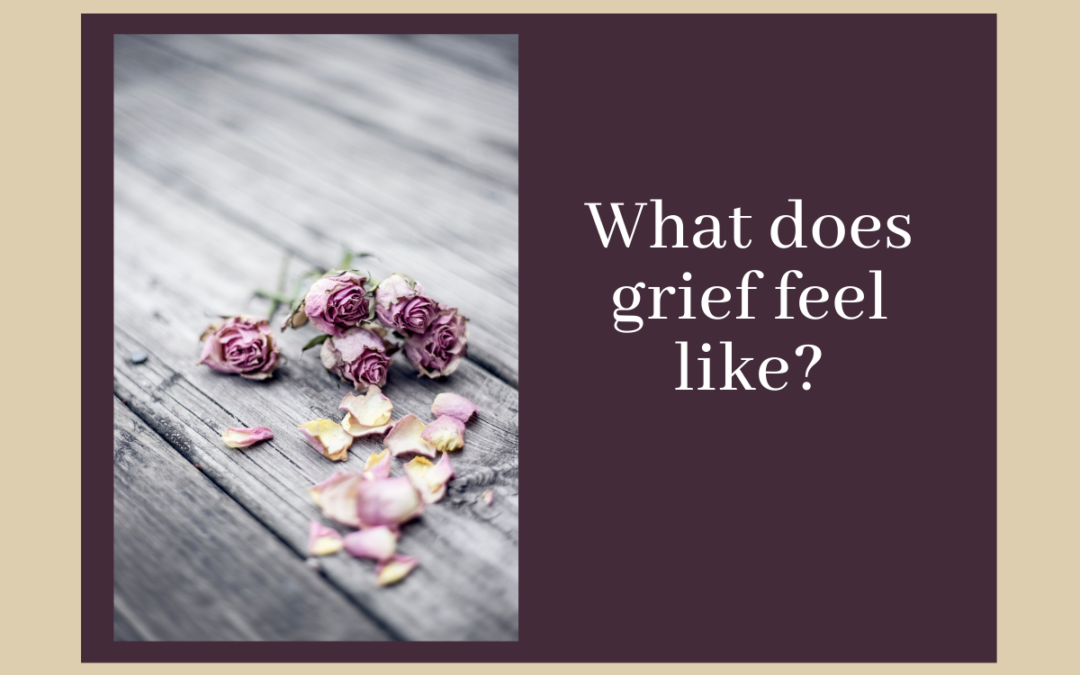My clients sometimes ask, what does grief feel like? How will I know that what I am feeling is grief?
Grief is a healing process we experience due to the loss of something significant. It is a natural reaction to our loss. Grief can last for months or years. There is no timeline to grief. Thoughts, feelings and emotions can come and go.
Some of the losses that are associated with a strong feeling of grief are:
Sudden death of someone close
Serious illness of a loved one
Death of a partner, family member or a friend
Break up of a relationship
Divorce
Death of a pet
A few other life events sometimes generate a strong feeling of grief. Some such circumstances are:
Moving to a new place
Loss of financial security
Loss of physical ability
Loss of a sense of freedom
Loss of health due to an illness
Types of grief
Anticipatory grief is grieving a loved one expecting death. The grieving process begins before the death of the person. It gives family members some time to prepare for the loss. This process might be confusing, give rise to conflicted feeling and guilt due to grieving someone who is still alive. It does not make the grieving process after the death any easier. Anticipatory grief is different from the grief that occurs after death. However, it allows some people to prepare for the loss and might help some people also find closure in the time they spend with the loved one.
Sudden loss of someone causes grief which is different from anticipatory grief. It is an unexpected loss, therefore the complete comprehension of the loss might take some time to set in. The loss might exceed our ability to cope with it. The initial reaction to the loss might be shock, feeling overwhelmed, unable to function.
What does grief feel like?
Our experience of grief is influenced by a lot of factors. To name a few, our past experience, present circumstances, our spiritual beliefs, cultural heritage, our support system. All individuals are different as is their reactions to loss and the duration of their grieving process. There is no right or wrong way of grieving. Following are a few feelings and reactions people might experience while going through the grieving process:
- Feeling numb, having a sense of shock or denial
- Being angry, irritated, frustrated
- Feeling a sense of shame and guilt, blame, relief, confusion
- Experiencing anxiety, nervousness, exhaustion and stress
- Feeling sad, crying easily
- Difficulty concentrating
- Experiencing change in eating and sleep pattern
Not feeling like oneself, isolating and withdrawing, loosing joy in things that used to be fun (symptoms of depression)
How will you know if you are done grieving?
As the intensity of the grieving process reduces we might get consumed by the fear and guilt of forgetting the person. Grieving is an ongoing process. It changes in intensity and how we integrate it in our life story. Grieving doesn’t only mean being angry, looking for blame or bargaining with ourselves or our higher power. I also means accepting, it is when we start drawing comfort from memories and not pain. We sense gratefulness for the amount of time we got to spend with the loved one.

We will always remember the people we lose throughout our life. They were near and dear to us. They have left some kind of an impact on our lives. They deserve to be grieved and mourned. Acceptance does not mean you are done with the loss and move on with life like it never happened. It just means that the grief does not dominate our emotions and is not the guiding force is decision making. As the intensity of grief reduces and it finds its place with all the other important experiences in our life, we notice that we are allowing ourselves to find joy in things we liked before the loss.
Treatment for grief
Grieving is a very difficult process. It comes with a tsunami of emotions. In the beginning it is almost impossible to comprehend our feelings. Grief keeps moving between the five stages: denial, anger, depression, bargaining and acceptance. At the same time not everyone goes through every single stage of grief.
Grief is unpredictable, the intensity may vary from day to day, there is no time table to grief and there is not a typical response to grief. Grief is like a roller coaster, it has highs and lows. In the beginning the lows might be longer and deeper. As time passes and we process our emotions and provide them an outlet the intensity of the emotions reduce and the lows become shorter and less intense.
In order to cope with grief we require to take care of ourselves and provide us with support. I am here to be that support for you. To provide you with a safe and secure environment to express and process the most daunting emotions. To be the supportive mirror that helps you face your feelings in a caring manner. To help you allow yourself to feel the way you naturally want to. Sometimes we are unable to process our grief on our own.


Recent Comments